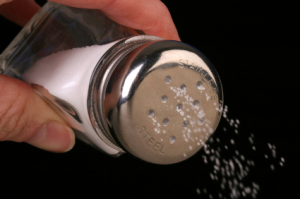by
Brendon Nafziger, DOTmed News Associate Editor | April 21, 2010

The salt police
are not here yet
The U.S. Food and Drug Administration denied it was mulling regulations of sodium content in food following claims made in a Washington Post article.
"The FDA is not currently working on regulations nor have they made a decision to regulate sodium content in foods at this time," the agency said in a statement.
In an article published Tuesday, the Washington Post said unnamed sources at the FDA claimed they would undertake a "10-year" program to regulate salt levels in food. They requested anonymity as the plan had not been formally announced yet.
The news comes on the heels of an Institute of Medicine report, made public available earlier that day, that calls for new government standards to control the amount of salt in the U.S. diet. According to estimates quoted by the IOM, national reductions in sodium could prevent 100,000 deaths every year.
Large quantities of salt raise blood pressure, which in turn makes the heart strain harder to pump, and can lead to heart and kidney disease, stroke and heart failure, according to the FDA and broad clinical consensus.
In 2008, Congress tapped IOM to find ways to reduce the country's sodium intake to that suggested by the U.S. Recommended Daily Daily Allowances, which is around 1 teaspoon of salt for children and adults. Currently, most Americans consume about 50% more than that. The FDA also sponsored the report, called "Strategies to Reduce Sodium Intake in the United States."
"The goal is to slowly, over time, reduce the sodium content of the food supply in a way that goes unnoticed by most consumers as individuals' taste sensors adjust to the lower levels of sodium," write the IOM about their plan on their Web site.
While the FDA often follows IOM recommendations, they are not legally obliged to do so.
